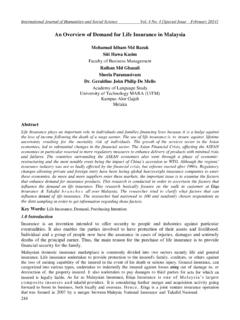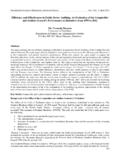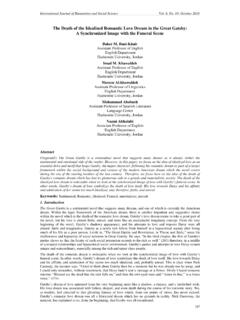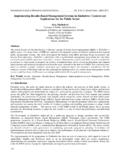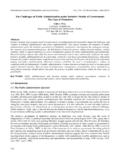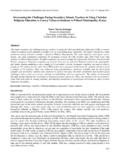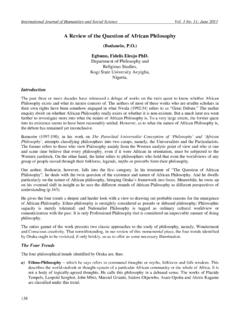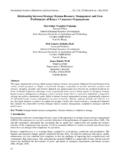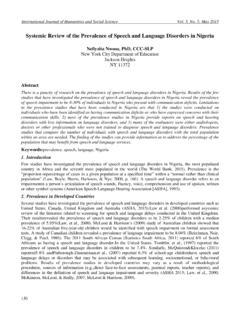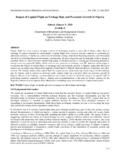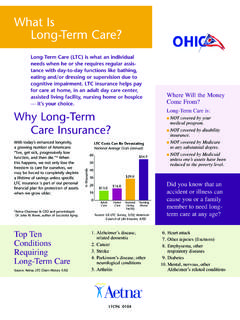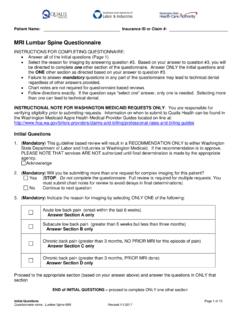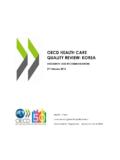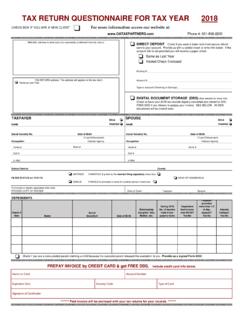Transcription of The Politics of Public Policy and Problems of ...
1 International Journal of Humanities and Social Science Vol. 4 No. 4 [Special Issue February 2014] 196 The Politics of Public Policy and Problems of implementation in africa : An Appraisal of Ghana s National Health Insurance Scheme in Ga East District Braimah Awaisu Imurana Faculty of Social Science Department of Political Science University of Ghana Legon Rufai Kilu Haruna Faculty of Management Department of Business Administration University of Professional Studies Accra Annin-Bonsu Nana Kofi Department of Political Science University of Ghana Legon Abstract This paper explores the Politics inherent in Public Policy making in africa with particular reference to Ghana s National Health Insurance Scheme.
2 A quantitative study that used a questionnaire and data collected was analyzed using simple statistical tools. The study revealed that affordability is a problem to some people; others complained the treatment they receive does not merit the premium they pay. Discrimination between NHIS card holders and non card holders also militates against the quality of service. Also, health education on the NHIS seems to have reached a large portion of the population, the only problem is ignorance of the health cases it covers and those it does not as well as the drugs it fails to provide. Further, the study reveals delay in issuance of cards still persists and limits the effectiveness of the scheme.
3 The study again reveals the relevance, but over ambitiousness of the NHIS due to its comprehensive and universal nature in a growing and developing country like Ghana. The study therefore recommends that, the government, private entities and the entire citizens of Ghana join hands in bipartisan agreement, weed out corruption, ensure meritocracy in employment, strengthen institutions and develop positive ownership of Public policies to lift the NHIS and other policies to a level of effective and efficient performance for all to gain maximum benefit. Key Words: Politics , Public Policy , national health insurance scheme and implementation Introduction Public policies in africa have been formulated and implemented over the years with the help of International organizations such as the International Monetary Fund and the World Bank.
4 Some have also been formulated single handedly by African political leaders aim at achieving radical and rapid improvement in the conditions of life after many years of colonial rule (Grindle, 1980). However, most of these policies are beclouded with Politics and implementation bottlenecks. The politicization of Public policies in africa has led to the formulation of overambitious policies by political parties to win political capital coupled with excessive bureaucratic procedures. An example is Nigeria s free education for all Policy which couldn t establish a strong Public education system but rather got many choosing private education as a better alternative (Makinde, 2005). Ghana is no exception, the economic conditions surrounding the formulation of the NHIS and its comprehensive coverage made it somewhat overambitious.
5 It is not surprising that the scheme is struggling to achieve set goals. Due to the false start at the formulation stage. Many Public policies in africa inevitably face challenges in the implementation stage making it difficult to address the major Problems for which they are established. The Special Issue on Contemporary Issues in Social Science Center for Promoting Ideas, USA 197 implementation stage of the Policy process is an operational phase where Policy is actually translated into action with the hope of solving some Public problem (Theodoulou & Kofinis, 2004). Ghana has formulated a lot of Public policies to solve Public Problems of various kinds since its independence in 1957.
6 The formulation of the National Health Insurance Scheme started in March 2001, was passed into law the same year and launched on the 18th of March 2004 by former president John A. Kuffour of the New Patriotic Party (NPP). The implementation of the NHIS law however did not take effect until March 2005. The stated objective of the NHIS is to ensure equitable universal access for all residents of Ghana to an acceptable quality of essential health services without out-of-pocket payment being required at the point of service use (Ghana Ministry of Health, 2004a). After the country s independence in 1957, Ghanaians had free access to health care. However government expenditure on healthcare began to soar between the late 1960s and the mid-1980s.
7 The high cost of health care coupled with a decline in economic development led the Rawlings administration to adopt the International Monetary Fund (IMF) and World Bank promoted Structural Adjustment Program (SAP) in 1983. The full burden of paying for health care was borne by patients as part of the SAP s objective of reducing government expenditure to the barest minimum. The final result was the introduction of the cash and carry system in 1985 which made it compulsory for everybody to pay money immediately before and after treatment in hospitals/clinics (Wahab, 2008). The NPP government in its first term of office introduced a sales tax , Health Insurance Levy in 2004 on selected goods and services to help fund the NHIS a campaign promise to address the perennial problem in Ghana the provision of safe and affordable healthcare to all residents.
8 Ghana has gone through the stages of Policy making to formulate policies to make life better for the citizenry. Examples of such policies are the School feeding program, Growth and Poverty Reduction Strategy I&II (GPRS I&II), National Youth Employment Program (NYEP) now GYEEDA among others. Regarding the NHIS, intense consultations were made with international health development partners such as the World Health Organization (WHO), Danish Development Agency (DANIDA), Department For International Development (DFID), International Labour Organization (ILO) as well as relevant national agencies and NGOs, aim at establishing the National Health Insurance Act of 2003( Mensah, Oppong & Schmidt, 2009 ).
9 The law made three types of schemes available: The District-Wide Mutual Health Insurance Scheme. The Private Mutual Health Insurance Scheme. The Private Commercial Health Insurance Scheme The benefit package includes general out-patient and in-patient services, oral health, eye care, emergencies and maternity care, including prenatal care, normal delivery, and some complicated deliveries. Diseases covered include malaria, diarrhoea, upper respiratory tract infections, skin diseases, hypertension, asthma and diabetes. In all, about 95% of the common health Problems in Ghana are covered (Ghana Ministry of Health, 2004a, 2004b). However, HIV antiretroviral therapy, hearing aids, denturesand VIP accommodations are exempted from the benefit package for District Schemes.
10 To ensure an effective implementation of the NHIS, the National Health Insurance Authority (NHIA) was established to: Register, license and regulate health insurance schemes, grant accreditation to healthcare providers and monitor their performance and undertake and sustain Public education on health insurance (Ghana Health Insurance Review, 2008). Other bodies such as the National Health Insurance Council, mutual health organizations and the Ministry of health were tasked to ensure the successful implementation of the NHIS in Ghana. Nevertheless, like most of the previous policies formulated in Ghana, the NHIS has implementation Problems , making it difficult to achieve its outlined objectives.
